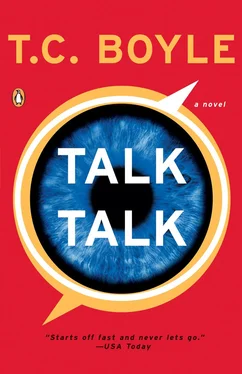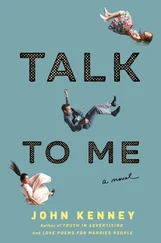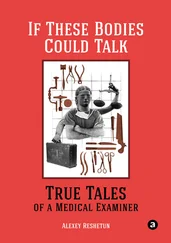She woke at first light, sweating, to an apprehension of movement just beyond the thin grid of the window screen. The atmosphere was heavy, tropical. There was a smell of dampness and mold, the fertile rejuvenate scent of things working in the earth, flowers unfolding, the insect armies stirring in their nests and dens and beneath the leaves of the trees crowded against the house. It smelled like rain, like ozone. For a moment she lay motionless, her eyes on the ceiling-she was getting her bearings, tracing backward through the rosary of events to the hospital and Terri, Bridger, Peck Wilson climbing out of his car and the fear that had exploded in her brain and chased her down the street-and then her eyes went to the screen. There was something there, a shadow, movement. Her heart was pounding. She sat up. And when she felt the door swing open behind her she nearly let out a scream-or maybe she did, maybe she did shout out-until she saw that it was only Terri, her shoulders slumped beneath the quilted fabric of a pale blue robe and her face dull and empty, half-asleep still, on her way to the bathroom. “Are you okay?” Terri signed reflexively.
“Sorry, I must have been dreaming,” Dana lied, each word an abstraction nobody could possibly understand, words lifted from the page and an ancient repository of memory in a hopeful way, in the way Bridger must have dredged up his high school Spanish at the taco stand or the car wash. He always felt relieved, he told her-or no, not just relieved, but amazed-when people understood him, as if they were communicating in a code that was indecipherable except in that one serendipitous moment.
The bathroom door opened and then closed on Terri and it was as if she'd never been there, an apparition faded away into insubstantiality, and there was the movement at the screen again, the movement that had woken her, but it wasn't Peck Wilson, at large still and come to sniff her out and finish what he'd begun, and it wasn't the afterimage of a dream either-it was just a squirrel, bloated with the easy pickings of high summer, dipping its head and manipulating its paws against the dark sheen of the wet and silken grass.
It was still overcast when she woke again. Terri was standing over her with a cup of coffee, a soft muted smile pressed to her lips. She was dressed and made-up, her hair brushed, jade earrings catching what there was of the dull light from beyond the window. “I didn't want to wake you,” she said, handing her the coffee. “There's cream and sugar if you want-I didn't know how you took it.”
“What time is it?” Dana asked, sitting up to cradle the cup in both hands.
“Ten-thirty.”
“Ten-thirty? I can't believe we slept so late-”
“All that running-you were tired.” Her teeth flashed. It was a joke. “But not to worry, it's Sunday, the one day of the week when people can sleep in.”
“What about the hospital? What about Bridger?”
Terri's face-her pretty, mobile, animated face-showed nothing. “I called fifteen minutes ago. No word. He's resting, that's what they said. We can visit anytime.”
The coffee was too hot, bitter-she preferred tea and when she did have coffee she drowned it in cream-but Dana lifted the cup to her lips, blew the steam away and drank, thanking Terri with her eyes. She felt overwhelmed suddenly. This girl, this young sweet-faced confiding girl, a stranger to her twenty-four hours ago, was her best friend in the world, a good person, genuine, caring, compassionate-“mother father deaf”-and for that she was grateful, infinitely grateful, grateful to the point of tears. But Terri was a crutch too, and her own mother would have been the first to point it out to her. “You don't have to babysit me,” she said.
Terri was drinking from a souvenir mug with the words “Fort Ticonderoga” superimposed in red over a wraparound stockade. “It's not a problem. And I'm not babysitting you, don't think that. I want to help, that's all.” Dana couldn't resist a smile. “Above and beyond the call of duty?”
Terri shrugged. “Sure,” she said. “Why not?”
“Nothing better to do?”
“I don't know-you want breakfast? Eggs? Cereal?”
Dana swung her legs away from the mattress, fished her shorts off the floor and slid them on. She needed a shower, her skin prickling with the residue of her sweat-she felt as if she'd been rolled in sugar like a doughnut-but the shower could wait. “No,” she said, looking up from lacing her shoes, “don't go to any trouble”-and she held up a hand to forestall the reply-“but I do need to call my mother. Just to let her know-”
Terri lifted her eyebrows and all the deaf expression flooded back into her features. “You want me to interpret-or are you going to text?”
“If you just tell me when she picks up, that would be great-I can talk and she can text. It's better that way, anyway-I wouldn't want to subject you to all that, because I'm sure you know the way mothers are. And my mother's a hundred times worse.”
Her mother picked up on the first ring. “Hi, Mom,” Dana said into the void.
“Where are you? I was worried.”
“Peterskill. Still. And don't worry, the car's fine, but we had to stay overnight because”-and she stalled a moment, feeling the emotion rise in her-“because Bridger, I mean, Peck Wilson. Peck Wilson came and beat him up and he's in the hospital.”
“Hospital?”
“He's all right. It's his throat. He got hit in the throat.”
There was nothing for a moment, then the LCD flashed across the miniature screen: “Didn't I tell you? You're always”- “He's okay. Everything's okay. We're going to the hospital in a minute and they said they would release him this afternoon so I guess you'll see us tonight.”
“Who's we?”
“Me and Terri. She's the interpreter from the police.”
“Did they catch him?”
Again the hesitation. It was as if she were the one who'd been kicked in the throat. “No. He-he got away.”
“I'm coming up there.”
“No, no-you don't have to. I can handle it, don't worry.”
“What hospital?”
She gave a little speech then, about independence-how her mother had always preached independence and here she was treating her like a child. How she was thirty-three years old and could handle herself. How anybody could have been the victim of a thief like this and it had nothing to do with her difference or her capability or the way she handled her finances and planned for the future or anything else. “Mom, listen,” she said finally, “I'm going to repeat this so you understand: I don't want you to come. Okay?”
“What hospital?”
The first thing she saw when she walked into the room, Terri at her side, was the flowers. A jungle of flowers, dahlias, tulips, lilies, gladiolus, roses-so many flowers it was as if they'd taken the wrong door off the corridor and wound up back outside again. The next thing was the snaking wiry form of a woman she'd never seen before rising up out of the floral riot to throw her a challenging look, and then she saw the bed, the monitors, the IV apparatus, and finally Bridger, reduced there against the null white field of the sheets. There was a bandage at his throat, whiter yet, folds of pristine gauze wrapped to his chin so that his head seemed separated from his body. His right eye was swollen shut. In fact-and she had to catch her breath as she came closer-she saw that the whole right side of his face was damaged, a dark striated cloud of scab scudding across the jaundiced bruise that sustained it. She felt stricken: he was hurt, badly hurt, and he wasn't going anywhere.
The woman-his mother, she knew this was his mother even before she looked in her face and saw his features replicated there, the nose, the eyes, the retreating bone structure and the pale orbicular expanse of the flesh-tried to stand in her way, tried to question her right, assert authority, but she shoved past her and went to him, her hand finding his and her lips pressed to the side of his beautiful ravaged face. “Oh, God,” she said, “oh, God, I'm so sorry,” and the tears were there, burning like acid, while things went on behind her, peripheral movement, gestures, his mother and Terri Alfano, her deliverer, working through the niceties. She lifted her head to look him in the eye, the good eye, the one that was dilated and clear. “Are you okay?” she asked from deep inside her, and the words didn't feel right, too pinched, in the wrong register, but she didn't care.
Читать дальше












